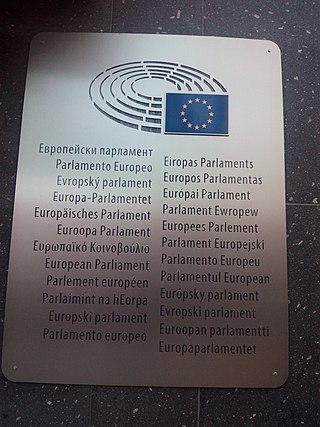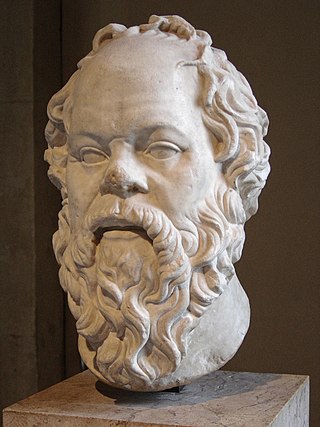Language education – the process and practice of teaching a second or foreign language – is primarily a branch of applied linguistics, but can be an interdisciplinary field. There are four main learning categories for language education: communicative competencies, proficiencies, cross-cultural experiences, and multiple literacies.

The European Union (EU) has 24 official languages, of which three – English, French and German – have the higher status of "procedural" languages of the European Commission. Irish previously had the lower status of "treaty language" before being upgraded to an official and working language in 2007. However, a temporary derogation was enforced until 1 January 2022. The three procedural languages are those used in the day-to-day workings of the institutions of the EU. The designation of Irish as a "treaty language" meant that only the treaties of the European Union were translated into Irish, whereas Legal Acts of the European Union adopted under the treaties did not have to be. Luxembourgish and Turkish, which have official status in Luxembourg and Cyprus, respectively, are the only two official languages of EU member states that are not official languages of the EU. In 2023, the Spanish government requested that its co-official languages Catalan, Basque, and Galician be added to the official languages of the EU.

The SOCRATES programme was an educational initiative of the European Commission; 31 countries took part. The initial Socrates programme ran from 1994 until 31 December 1999 when it was replaced by the Socrates II programme on 24 January 2000, which ran until 2006. This, in turn, was replaced by the Lifelong Learning Programme 2007–2013.

CELTA is an initial teacher training qualification for teaching English as a second or foreign language (ESL and EFL). It is provided by Cambridge Assessment English through authorised Cambridge English Teaching Qualification centres and can be taken either full-time or part-time. CELTA was developed to be suitable both for those interested in Teaching English as a Foreign Language (TEFL) and for Teaching English to the Speakers of Other Languages (TESOL). The full name of the course was originally the Certificate in English Language Teaching to Adults and is still referred to in this way by some course providers. However, in 2011 the qualification title was amended on the Ofqual register to the Cambridge English Level 5 Certificate In Teaching English to Speakers of Other Languages (CELTA) in order to reflect the wider range of students that teachers might have, including younger learners.

The Lifelong Learning Programme 2007–2013 was the European Union programme for education and training.

European Union culture policies aim to address and promote the cultural dimension of European integration through relevant legislation and government funding. These policies support the development of cultural activity, education or research conducted by private companies, NGO's and individual initiatives based in the EU working in the fields of cinema and audiovisual, publishing, music and crafts.
In the European Union education is at the responsibility of its Member States and their Ministries of education that they have; in such, the European Union institutions play only a supporting and overseeing role. According to Art. 165 of the Treaty on the Functioning of the European Union, the Community
shall contribute to the development of quality education by encouraging cooperation between Member States, through actions such as promoting the mobility of citizens, designing joint study programmes, establishing networks, exchanging information or teaching languages of the European Union. The Treaty also contains a commitment to promote life-long learning for all citizens of the Union.

The European Day of Languages is observed 26 September, as proclaimed by the Council of Europe on 6 December 2001, at the end of the European Year of Languages (2001), which had been jointly organised by the Council of Europe and the European Union. Its aim is to encourage language learning across Europe.

Leonard Orban is a Romanian independent technocrat who served as the Commissioner for Multilingualism in the European Commission, the executive body of the European Union (EU). He was responsible for the EU language policy and was the first Romanian Commissioner and the first member of the Commission whose portfolio is exclusively multilingualism. His term of office began on 1 January 2007 and ended on 9 February 2010. With a background in engineering and economics, Orban has taken up various posts working for the accession of Romania to the European Union, most prominently as Deputy and later as Chief Negotiator for his country at the time of final negotiations with the European Union.
Eklavya is an Indian NGO based in Bhopal, Madhya Pradesh working in the field of education. It was registered as an all India in 1982. The organization is named after Eklavya, the protagonist of a story in the Mahabharat, for his determination to learn even in the absence of a teacher.
The European History Network has run a number of projects under the banner of the Creating Links and Overviews for a New History Agenda (CLIOH) since 1988, including CLIOH, CLIOHnet and CLIOHnet2. Both CLIOHRES and CLIOH-WORLD are currently in operation as of December 2011. It was initially founded as the ECTS History Network, a pilot project of the ECTS.
Multilingual education typically refers to "first-language-first" education, that is, schooling which begins in the mother tongue and transitions to additional languages. Typically MLE programs are situated in developing countries where speakers of minority languages, i.e. non-dominant languages, tend to be disadvantaged in the mainstream education system. There are increasing calls to provide first-language-first education to immigrant children from immigrant parents who have moved to the developed world.
Grammar Explorer is a language learning resource that was co-founded by the European Commission as a part of its Lingua programme within the SOCRATES programme. The grammar is based on the requirements of The Common European Framework of Reference for Languages.
Content and language integrated learning (CLIL) is an approach for learning content through an additional language, thus teaching both the subject and the language.
Mostar Friedensprojekt e.V. is, since 1994, a registered non-governmental, non-profit organization with charitable commitments in the state of Brandenburg, located in the city center of Potsdam. The association organizes socio-cultural activities, artistic and cultural events and cultural publications at the local, regional and national level. It offers information, general support, advice, logistic and humanitarian aid, job qualifications and consultancy to refugees and asylum seekers in the region of Brandenburg and Berlin. Mostar Friedensproject is constantly coordinating and leading youth exchanges, European Voluntary Service, trainings, conferences, events and other support facilities within the framework of the European program Youth, Grundtvig, Europe for Citizen and LiFelong Learning. The association has the partners in many European countries, particularly in the Western Balkan, East Europe and the Caucasus.
English Profile is an interdisciplinary research programme designed to enhance the learning, teaching and assessment of English worldwide. The aim of the programme is to provide a clear benchmark for progress in English by clearly describing the language that learners need at each level of the Common European Framework of Reference for Languages (CEFR). By making the CEFR more accessible, English Profile will provide support for the development of curricula and teaching materials, and in assessing students' language proficiency.

COMPAT.eGov is a European LLP research project financed through the Lifelong Learning Programme of the European Union. The project consortium is composed of eight partners from four countries.
DISCO – European Dictionary of Skills and Competences is a structured vocabulary for the description of skills and competences in different contexts such as labour market, education, and training, and the recognition of qualifications. DISCO provides skills and competences classification that is neither linked to occupations nor to qualifications. Instead it functions as a thesaurus of skills and competences which is based on existing international standards and classifications and thus represents a terminological basis for the description of skills and competences, occupations as well as personal skill profiles and CVs, job vacancies, and job requirements or for describing curricula, courses, Diploma and Certificate Supplements or learning outcomes in general. Available in ten language versions, DISCO is meant to support transnational comparability of competences acquired in an educational or work context throughout Europe.
EUF - Campus Europae is a European network which aims at the promotion of high quality student mobility and contributing to educating a generation of European graduates with an innate understanding of Europe’s unity in diversity. The project is under the patronage of the Government of the Grand Duchy of Luxembourg and its secretariat is in Oetrange.
Virtual exchange is an instructional approach or practice for language learning. It broadly refers to the "notion of 'connecting' language learners in pedagogically structured interaction and collaboration" through computer-mediated communication for the purpose of improving their language skills, intercultural communicative competence, and digital literacies. Although it proliferated with the advance of the internet and web 2.0 technologies in the 1990s, its roots can be traced to learning networks pioneered by Célestin Freinet in 1920s and, according to Dooly, even earlier in Jardine's work with collaborative writing at the University of Glasgow at the end of the 17th to the early 18th century.






